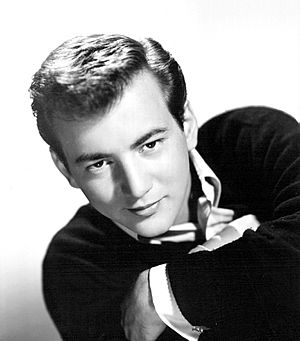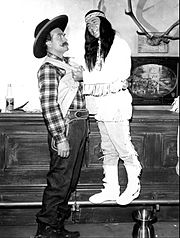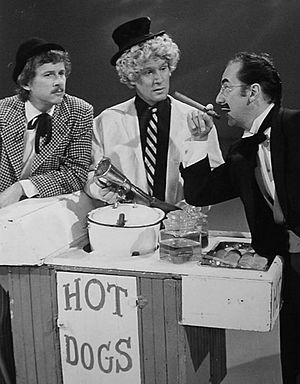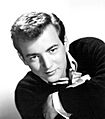Bobby Darin facts for kids
Quick facts for kids
Bobby Darin
|
|
|---|---|

Darin in 1959
|
|
| Born |
Walden Robert Cassotto
May 14, 1936 New York City, New York, U.S.
|
| Died | December 20, 1973 (aged 37) Los Angeles, California, U.S.
|
| Occupation |
|
| Years active | 1956–1973 |
| Spouse(s) |
|
| Children | 1 |
| Musical career | |
| Genres | |
| Instruments |
|
| Labels | |
Bobby Darin (born Walden Robert Cassotto; May 14, 1936 – December 20, 1973) was a talented American musician and actor. He was famous for singing many different styles of music, including jazz, pop, rock and roll, folk, swing, and country music.
Bobby Darin began his career writing songs for other artists. In 1958, he released his first huge hit, "Splish Splash". This was followed by other popular songs like "Dream Lover", "Mack the Knife", and "Beyond the Sea". These songs made him famous around the world. In 1962, he won a Golden Globe Award for his first movie, Come September. He starred in this film with his first wife, actress Sandra Dee.
During the 1960s, Bobby Darin became very interested in politics. He worked on Robert F. Kennedy's campaign for president. He was even at the Ambassador Hotel in Los Angeles when Robert Kennedy was sadly assassinated in June 1968. That same year, Darin learned a surprising family secret: the woman who raised him was actually his grandmother, and the woman he thought was his sister was his real mother. These big events affected him deeply, and he spent some time away from the public eye.
Even though he had health problems from childhood rheumatic fever, he made a successful return to television in the early 1970s. He always knew his health was fragile, which pushed him to use his musical talents while he was young. Bobby Darin passed away at age 37 in 1973, after a heart operation in Los Angeles.
Contents
Bobby Darin's Early Life
Walden Robert Cassotto was born on May 14, 1936, in East Harlem, a neighborhood in New York City. His grandmother, Vivian Fern Walden, who was a vaudeville singer, raised him from birth. She was known as "Polly." His birth mother, Nina Cassotto, was Polly's daughter. Nina became pregnant when she was 17. To keep it a secret, Nina and Polly decided to raise the baby as Nina's younger brother.
So, Bobby grew up believing Nina was his older sister and Polly was his mother. In 1968, when he was 32, Nina told him the truth. This news was very upsetting for Darin. His mother never told him who his biological father was, and she kept that secret until she passed away in 1983.
As a teenager, Bobby Darin was very musical. He could play several instruments, including the piano, drums, and guitar. Later, he also learned to play the harmonica and xylophone.
Bobby moved to the Bronx when he was young. He graduated from the well-known Bronx High School of Science. He later said that being around so many smart students there, who sometimes teased him, made him a bit arrogant. After high school, he went to Hunter College and became interested in acting. He left college after only two semesters to chase his dream of becoming an actor.
When he started recording music, Walden Robert Cassotto chose the stage name Bobby Darin. He got the name from the actor Darren McGavin. However, he always said his legal name would remain Cassotto, as it was his mother's name and would be his children's name.
Bobby Darin's Music Career
Bobby Darin's music career really started in 1955. He formed a songwriting team with Don Kirshner. They met at a candy store in Washington Heights, Manhattan. They wrote jingles and songs together. In 1956, Bobby signed a contract with Decca Records, but his songs there didn't become very popular.
Darin was part of a group of songwriters working in the famous Brill Building. He met singer Connie Francis and helped her write several songs. They also had a close relationship, but Connie's father didn't approve, and they eventually broke up.
Bobby left Decca and signed with Atlantic Records' Atco subsidiary. Here, he wrote and arranged music for himself and other artists. Some of his early recordings were in an Elvis-like style, which didn't quite fit his own personality.
With help from Atlantic's co-founder Ahmet Ertegun, Darin's career took off in 1958. He recorded "Splish Splash". He wrote this song with radio DJ Murray Kaufman. Kaufman's mother gave them the idea for the title. Darin wrote the song in just one hour! "Splish Splash" was his first big hit in the rock and roll genre, selling over a million copies.
In 1959, Darin recorded "Dream Lover", a ballad he wrote himself. It sold millions of copies and brought him financial success. This allowed him to have more creative control over his music. He wanted his album That's All to show he could sing more than just rock and roll. His next single, "Mack the Knife", was a jazz-pop version of a song from a musical. Even though Darin wasn't sure about releasing it as a single, the song became a No. 1 hit for nine weeks and sold two million copies.
In 1960, "Mack the Knife" won the Grammy Award for Record of the Year. Bobby Darin was also named the Grammy Award for Best New Artist that year. "Mack the Knife" has since received a Grammy Hall of Fame Award.
Darin followed "Mack the Knife" with "Beyond the Sea". This was a jazzy English version of a French hit song. Both songs were produced by Atlantic founders Ahmet and Nesuhi Ertegun and featured arrangements by Richard Wess.
In the late 1950s, Bobby Darin became incredibly popular. He set an attendance record at the Copacabana nightclub in New York City. He also performed as a headliner at major casinos in Las Vegas.
In 1960, Darin recorded "Artificial Flowers". This song was about the sad death of a child laborer. It had a jazzy, big band sound that was a strong contrast to its sad lyrics.
In the 1960s, Darin owned a music company with Doris Day's son, Terry Melcher. He signed Wayne Newton and gave him the song "Danke Schoen", which became a big hit for Newton. Darin also helped Roger McGuinn, who later formed the Byrds.
In 1962, Darin started singing country music. He had hits like "Things" (1962), "You're the Reason I'm Living", and "18 Yellow Roses". He joined Capitol Records in 1962, then returned to Atlantic three years later. In 1966, he had his last UK hit with "If I Were A Carpenter". He also sang the opening and closing songs for the 1965 Walt Disney film That Darn Cat!.
Bobby Darin's Acting Career

In late 1959, Bobby Darin appeared in an episode of Jackie Cooper's TV show Hennesey. That same year, he became the only actor ever to sign contracts with five major Hollywood film studios. He also wrote music for some of the films he appeared in.
His first big movie was Come September (1961). It was a romantic comedy starring Rock Hudson, Gina Lollobrigida, and 18-year-old actress Sandra Dee. Bobby and Sandra met while making the film and got married soon after. Their son, Dodd Mitchell Darin, was born on December 16, 1961. Dee and Darin made a few more movies together.
In 1961, he starred as a jazz musician in Too Late Blues. Critics noted that Darin was a surprise in his first non-singing role, showing both confidence and vulnerability. In 1962, Darin won a Golden Globe Award for "New Star of the Year – Actor" for his role in Come September. The next year, he was nominated for a Best Actor Golden Globe for Pressure Point.
In 1963, he was nominated for an Academy Award for Best Supporting Actor. This was for his role as a soldier deeply affected by war in Captain Newman, M.D.
In October 1964, he appeared in an episode of NBC's Wagon Train TV series. He played a former prisoner who becomes friends with an orphan girl.
Bobby Darin's Later Years

As the 1960s went on, Bobby Darin became more involved in politics. His music also became more "folksy". In 1966, he had a hit with folksinger Tim Hardin's "If I Were a Carpenter". This brought him back into the Top 10 after two years.
Darin traveled with Robert F. Kennedy and worked on his 1968 presidential campaign. He was with Kennedy in Los Angeles on June 4, 1968, and was at the Ambassador Hotel when Kennedy was assassinated. This tragic event, along with learning about his true parents, deeply affected Darin. He spent most of the next year living quietly in a trailer near Big Sur.
When he returned to Los Angeles in 1969, Darin started his own record label called Direction Records. He released folk and protest music on this label. Darin wrote "Simple Song of Freedom" in 1969. Interestingly, Tim Hardin recorded it first, and it became Hardin's best-selling record. Darin himself sang the song live on several TV shows.
About his first Direction album, Darin said he wanted the label to find "statement-makers." He explained that the album's songs were meant to show his thoughts on the challenging parts of modern society. He later signed with Motown.
Starting in July 1972, he starred in his own TV variety show on NBC, Dean Martin Presents: The Bobby Darin Amusement Company. This show ran for seven episodes. From January to April 1973, he starred in another NBC show called The Bobby Darin Show. Darin continued to make guest appearances on TV and remained a popular performer.
Other Interests
Bobby Darin loved to play chess. His television show sometimes included a part where he would explain a chess move. He even planned a big chess tournament with the United States Chess Federation. It would have had the largest prize money in history, but it was canceled after he passed away.
Personal Life
Bobby Darin married actress Sandra Dee on December 1, 1960. They met while filming Come September. Their son, Dodd Mitchell Darin, was born on December 16, 1961. Dee and Darin divorced on March 7, 1967.
Darin's second wife was Andrea Yeager, a legal secretary. They met in 1970 and married on June 25, 1973. However, they divorced just four months later in October 1973, due to the stress of Darin's worsening health problems.
Health Challenges
Bobby Darin had poor health throughout his life. He was a frail baby. Starting at age eight, he had repeated attacks of rheumatic fever. This illness seriously weakened his heart. In January 1971, he had his first heart surgery to implant two artificial valves. He spent most of that year recovering.
During the last few years of his life, he often needed oxygen during and after his performances.
Bobby Darin's Death
In 1973, Bobby Darin developed a serious infection because he didn't take antibiotics to protect his heart before a dental visit. This infection further weakened his body and affected one of his heart valves. On December 11, he went to Cedars of Lebanon Hospital in Los Angeles for another open-heart surgery. This surgery was to repair the artificial heart valves he had received earlier. On the evening of December 19, a team of surgeons worked for over six hours on his heart. Sadly, shortly after the surgery ended in the early morning hours of December 20, 1973, Bobby Darin passed away in the recovery room without waking up. He was only 37 years old.
Bobby Darin's last wish was to donate his body to science for medical research. His remains were transferred to the UCLA Medical Center soon after his death.
Bobby Darin's Legacy
In 1990, Bobby Darin was honored by being inducted into the Rock and Roll Hall of Fame. His close friend, singer Paul Anka, announced the honor. In 1999, Darin was voted into the Songwriters Hall of Fame.
The songwriter Alan O'Day mentioned Darin and his song "Mack the Knife" in the song "Rock and Roll Heaven". This song, made famous by the Righteous Brothers, pays tribute to musicians who have passed away.
On May 14, 2007, Bobby Darin received a star on the Las Vegas Walk of Stars. This honored his contributions to making Las Vegas a top entertainment city. Fans helped pay for the star. Darin also has a star on the Hollywood Walk of Fame.
On December 13, 2009, the Recording Academy gave Darin a special Lifetime Achievement Award at the 2010 Grammy Awards ceremony. This award was given after his death.
Biopic Film: Beyond the Sea
In 1986, director Barry Levinson planned to make a movie about Bobby Darin's life. Actor Kevin Spacey later bought the rights to the story, along with Darin's son, Dodd. The movie, called Beyond the Sea, starred Kevin Spacey as Bobby Darin. Spacey used his own singing voice for the songs in the film. The movie covers much of Darin's life and career, including his marriage to Sandra Dee, who was played by Kate Bosworth.
With permission from Darin's family, Beyond the Sea premiered at the 2004 Toronto International Film Festival. Although Darin's son, Sandra Dee, and his former manager loved Spacey's performance, the movie received mixed reviews and didn't do very well at the box office. However, Kevin Spacey was nominated for a Golden Globe Award for Best Actor.
Musical: Dream Lover
In September 2016, a musical about Bobby Darin's life, called Dream Lover: The Bobby Darin Musical, opened in Sydney, Australia. The show told Darin's story with an 18-piece big band. David Campbell played Bobby Darin. Darin had a very unusual childhood, being raised by his grandmother and thinking his mother was his sister. Campbell had a similar upbringing, which made Bobby's son, Dodd Darin, say Campbell was perfect for the role. Campbell also felt a strong connection to the role, calling it a "cathartic experience." The musical was nominated for six awards, and Campbell won the Helpmann Award for Best Male Actor in a Musical.
Images for kids
-
Dean Martin Presents: The Bobby Darin Amusement Company, L-R: Dick Smothers, Tom Smothers, and Bobby Darin as the Marx Brothers (1972)
See also
 In Spanish: Bobby Darin para niños
In Spanish: Bobby Darin para niños




